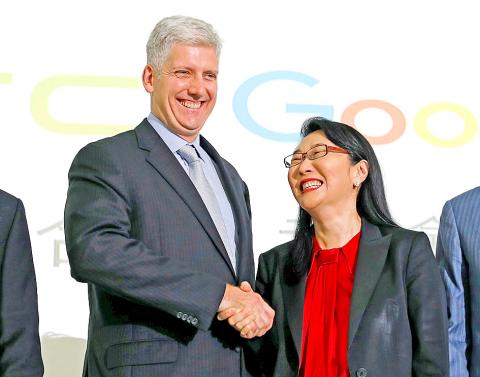HTC Corp (宏達電) yesterday announced that it is selling the research and development team that worked on the Pixel smartphone and its nonexclusive license for intellectual property to Google for US$1.1 billion in cash.
About 2,000 members of the “Power by HTC” team, which is nearly 50 percent of the Taiwanese firm’s more than 4,000 employees working on research and development, are to join the US tech giant under the agreement, HTC said.
The deal represents only a partial sale of HTC’s smartphone business, as it is to continue to produce handsets under its own brand.

Photo: Reuters
The agreement does not include HTC’s manufacturing assets, it said.
“The agreement is to ensure that HTC’s smartphone business can keep going. I believe it also benefits HTC’s talents and their families, as Google has a good track record for taking care of its employees,” HTC chairwoman and CEO Cher Wang (王雪紅) told a joint news conference with Google executives at HTC’s headquarters in New Taipei City’s Sindian District (新店).
HTC is working on the U11 Plus, which is expected to hit the market later this year, and is developing a premium model that is to be launched next year, Wang said.
Google senior vice president of hardware Rick Osterloh said the agreement with HTC adds a new page to Google’s presence in Taiwan and is to help it take “a big leap in building the core in consumer hardware development.”
“We did this agreement because we value the talents and experience that HTC has... Winning in the long run is the reason we inked the deal with HTC,” Osterloh said.
Google is still working out the details for a location in Taiwan for the team, he said.
Osterloh declined to disclose whether contracts with HTC employees affected by the deal would be permanent or short-term.
HTC chief financial officer Peter Shen (沈道邦) said it was necessary to shrink the company’s research and development team and to adjust its product strategy, as it has posted two years of consecutive net losses.
“Overall, the agreement will result in a 30 percent to 40 percent reduction in HTC’s operating expenses,” Shen told a news conference at the Taiwan Stock Exchange earlier yesterday.
The transaction is expected to be completed by early next year and the firm plans to use the US$1.1 billion to develop HTC-branded smartphones, as well as virtual reality, mixed reality, artificial intelligence and 5G connectivity technologies, he added.
HTC cumulative net losses reached NT$3.98 billion (US$131.75 million) in the first half of this year, compared with NT$5.67 billion in net losses over the same period last year, company data showed.
It reported revenue of NT$3 billion last month, the lowest monthly figure since HTC was listed on the Taiwan Stock Exchange in March 2002, the data showed.

‘ABUSE OF POWER’: Lee Chun-yi allegedly used a Control Yuan vehicle to transport his dog to a pet grooming salon and take his wife to restaurants, media reports said Control Yuan Secretary-General Lee Chun-yi (李俊俋) resigned on Sunday night, admitting that he had misused a government vehicle, as reported by the media. Control Yuan Vice President Lee Hung-chun (李鴻鈞) yesterday apologized to the public over the issue. The watchdog body would follow up on similar accusations made by the Chinese Nationalist Party (KMT) and would investigate the alleged misuse of government vehicles by three other Control Yuan members: Su Li-chiung (蘇麗瓊), Lin Yu-jung (林郁容) and Wang Jung-chang (王榮璋), Lee Hung-chun said. Lee Chun-yi in a statement apologized for using a Control Yuan vehicle to transport his dog to a

Taiwan yesterday denied Chinese allegations that its military was behind a cyberattack on a technology company in Guangzhou, after city authorities issued warrants for 20 suspects. The Guangzhou Municipal Public Security Bureau earlier yesterday issued warrants for 20 people it identified as members of the Information, Communications and Electronic Force Command (ICEFCOM). The bureau alleged they were behind a May 20 cyberattack targeting the backend system of a self-service facility at the company. “ICEFCOM, under Taiwan’s ruling Democratic Progressive Party, directed the illegal attack,” the warrant says. The bureau placed a bounty of 10,000 yuan (US$1,392) on each of the 20 people named in

The High Court yesterday found a New Taipei City woman guilty of charges related to helping Beijing secure surrender agreements from military service members. Lee Huei-hsin (李慧馨) was sentenced to six years and eight months in prison for breaching the National Security Act (國家安全法), making illegal compacts with government employees and bribery, the court said. The verdict is final. Lee, the manager of a temple in the city’s Lujhou District (蘆洲), was accused of arranging for eight service members to make surrender pledges to the Chinese People’s Liberation Army in exchange for money, the court said. The pledges, which required them to provide identification

INDO-PACIFIC REGION: Royal Navy ships exercise the right of freedom of navigation, including in the Taiwan Strait and South China Sea, the UK’s Tony Radakin told a summit Freedom of navigation in the Indo-Pacific region is as important as it is in the English Channel, British Chief of the Defence Staff Admiral Tony Radakin said at a summit in Singapore on Saturday. The remark came as the British Royal Navy’s flagship aircraft carrier, the HMS Prince of Wales, is on an eight-month deployment to the Indo-Pacific region as head of an international carrier strike group. “Upholding the UN Convention on the Law of the Sea, and with it, the principles of the freedom of navigation, in this part of the world matters to us just as it matters in the